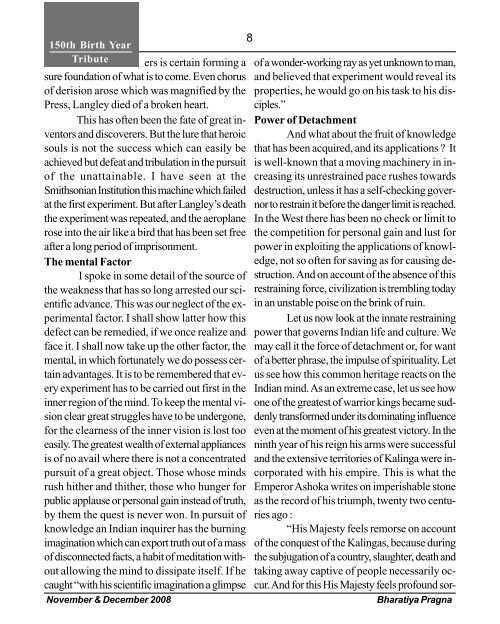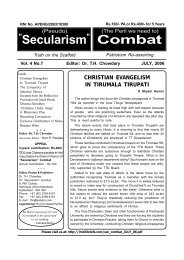Bharatiya Pragna - Dr. Th Chowdary
Bharatiya Pragna - Dr. Th Chowdary
Bharatiya Pragna - Dr. Th Chowdary
Create successful ePaper yourself
Turn your PDF publications into a flip-book with our unique Google optimized e-Paper software.
150th Birth Year<br />
Tribute<br />
ers is certain forming a<br />
sure foundation of what is to come. Even chorus<br />
of derision arose which was magnified by the<br />
Press, Langley died of a broken heart.<br />
<strong>Th</strong>is has often been the fate of great inventors<br />
and discoverers. But the lure that heroic<br />
souls is not the success which can easily be<br />
achieved but defeat and tribulation in the pursuit<br />
of the unattainable. I have seen at the<br />
Smithsonian Institution this machine which failed<br />
at the first experiment. But after Langley’s death<br />
the experiment was repeated, and the aeroplane<br />
rose into the air like a bird that has been set free<br />
after a long period of imprisonment.<br />
<strong>Th</strong>e mental Factor<br />
I spoke in some detail of the source of<br />
the weakness that has so long arrested our scientific<br />
advance. <strong>Th</strong>is was our neglect of the experimental<br />
factor. I shall show latter how this<br />
defect can be remedied, if we once realize and<br />
face it. I shall now take up the other factor, the<br />
mental, in which fortunately we do possess certain<br />
advantages. It is to be remembered that every<br />
experiment has to be carried out first in the<br />
inner region of the mind. To keep the mental vision<br />
clear great struggles have to be undergone,<br />
for the clearness of the inner vision is lost too<br />
easily. <strong>Th</strong>e greatest wealth of external appliances<br />
is of no avail where there is not a concentrated<br />
pursuit of a great object. <strong>Th</strong>ose whose minds<br />
rush hither and thither, those who hunger for<br />
public applause or personal gain instead of truth,<br />
by them the quest is never won. In pursuit of<br />
knowledge an Indian inquirer has the burning<br />
imagination which can export truth out of a mass<br />
of disconnected facts, a habit of meditation without<br />
allowing the mind to dissipate itself. If he<br />
caught “with his scientific imagination a glimpse<br />
8<br />
of a wonder-working ray as yet unknown to man,<br />
and believed that experiment would reveal its<br />
properties, he would go on his task to his disciples.”<br />
Power of Detachment<br />
And what about the fruit of knowledge<br />
that has been acquired, and its applications ? It<br />
is well-known that a moving machinery in increasing<br />
its unrestrained pace rushes towards<br />
destruction, unless it has a self-checking governor<br />
to restrain it before the danger limit is reached.<br />
In the West there has been no check or limit to<br />
the competition for personal gain and lust for<br />
power in exploiting the applications of knowledge,<br />
not so often for saving as for causing destruction.<br />
And on account of the absence of this<br />
restraining force, civilization is trembling today<br />
in an unstable poise on the brink of ruin.<br />
Let us now look at the innate restraining<br />
power that governs Indian life and culture. We<br />
may call it the force of detachment or, for want<br />
of a better phrase, the impulse of spirituality. Let<br />
us see how this common heritage reacts on the<br />
Indian mind. As an extreme case, let us see how<br />
one of the greatest of warrior kings became suddenly<br />
transformed under its dominating influence<br />
even at the moment of his greatest victory. In the<br />
ninth year of his reign his arms were successful<br />
and the extensive territories of Kalinga were incorporated<br />
with his empire. <strong>Th</strong>is is what the<br />
Emperor Ashoka writes on imperishable stone<br />
as the record of his triumph, twenty two centuries<br />
ago :<br />
“His Majesty feels remorse on account<br />
of the conquest of the Kalingas, because during<br />
the subjugation of a country, slaughter, death and<br />
taking away captive of people necessarily occur.<br />
And for this His Majesty feels profound sor-<br />
November & December 2008 <strong>Bharatiya</strong> <strong>Pragna</strong>



